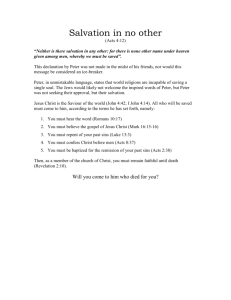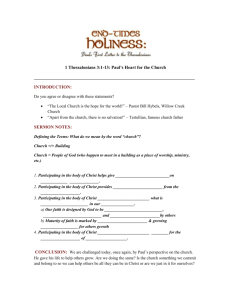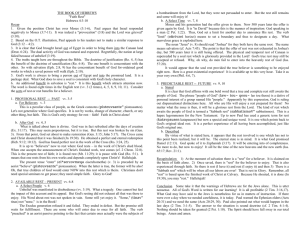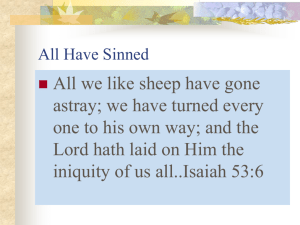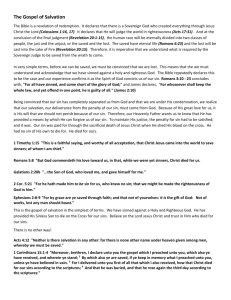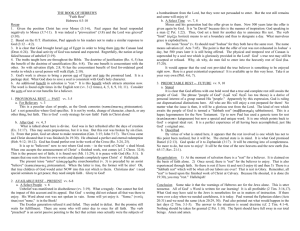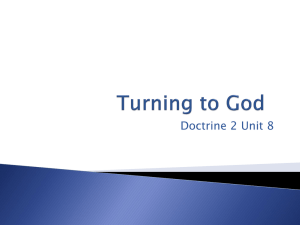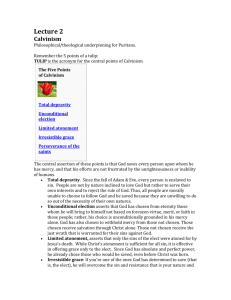LOGOS BIBLE INSTITUTE
advertisement
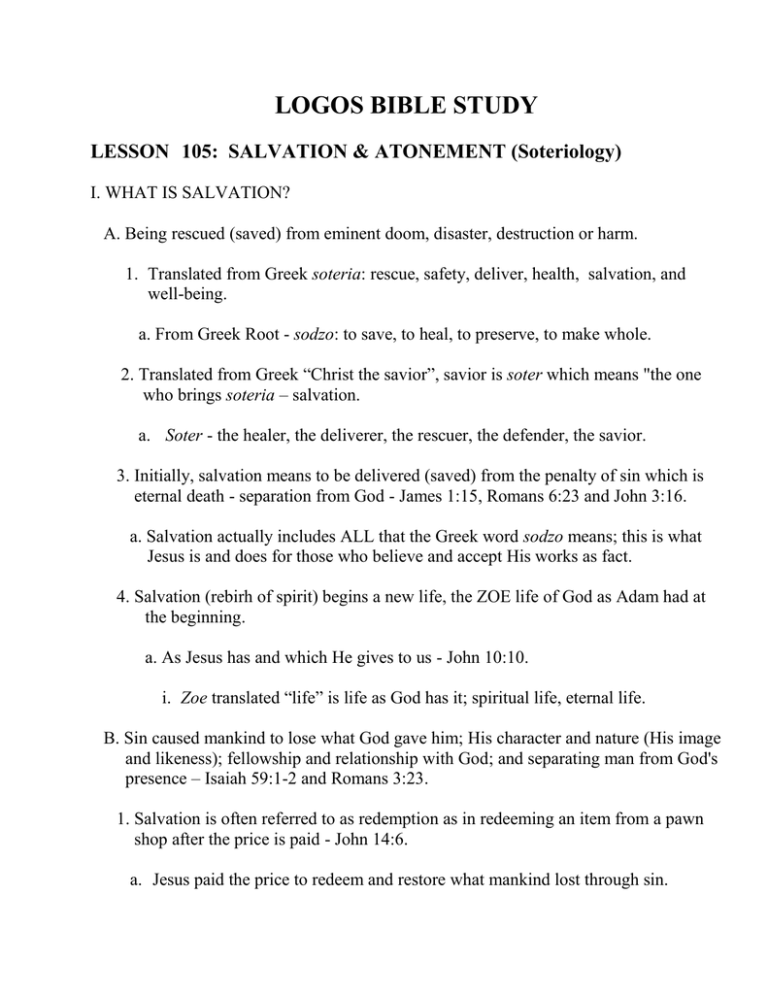
LOGOS BIBLE STUDY LESSON 105: SALVATION & ATONEMENT (Soteriology) I. WHAT IS SALVATION? A. Being rescued (saved) from eminent doom, disaster, destruction or harm. 1. Translated from Greek soteria: rescue, safety, deliver, health, salvation, and well-being. a. From Greek Root - sodzo: to save, to heal, to preserve, to make whole. 2. Translated from Greek “Christ the savior”, savior is soter which means "the one who brings soteria – salvation. a. Soter - the healer, the deliverer, the rescuer, the defender, the savior. 3. Initially, salvation means to be delivered (saved) from the penalty of sin which is eternal death - separation from God - James 1:15, Romans 6:23 and John 3:16. a. Salvation actually includes ALL that the Greek word sodzo means; this is what Jesus is and does for those who believe and accept His works as fact. 4. Salvation (rebirh of spirit) begins a new life, the ZOE life of God as Adam had at the beginning. a. As Jesus has and which He gives to us - John 10:10. i. Zoe translated “life” is life as God has it; spiritual life, eternal life. B. Sin caused mankind to lose what God gave him; His character and nature (His image and likeness); fellowship and relationship with God; and separating man from God's presence – Isaiah 59:1-2 and Romans 3:23. 1. Salvation is often referred to as redemption as in redeeming an item from a pawn shop after the price is paid - John 14:6. a. Jesus paid the price to redeem and restore what mankind lost through sin. b. Back to fellowship and relationship to God by eliminating the barrier of separation, the influence of sin – 1 Peter 2:21-25 & 1 Corinthians 15:2-4. i. Restoring God’s character and nature to man. ii. More on this topic in lesson following lessons. 2. Redemption restores all that was lost by sin. a. Including righteousness, peace, health, joy, happiness and the blessings of the Kingdom. II. WHAT IS ATONEMENT? The price paid reconciliation; the cost to redeem! A. The Old Testament (old covenant) method covered or transferred the penalty of sin. 1. Since death is the consequence of sin, then someone or something alive and adequate (pure) must give its life to pay the penalty - Leviticus 4:32-35. B. Christ became the means of atonement, the sin offering of the New Testament (the new covenant) - Isaiah 53:6-10. 1. Until the advent of Christ, the sacrifice of goats and lambs was the sin offering (atonement) used - Hebrews 10:10-12,17-18. a. The sacrifice of goats and lambs only covered sin but did not remove it; it only paid the penalty for it - Hebrews 10:1-4. C. Christ's work did more than cover and pay the penalty, it restored ZOE (life) and RIGHTEOUSNESS to the receiver. 1. Jesus put our sin on as a cloak; clothed with all our sins; taking our sins from us. a. We who receive His atonement then receive His righteousness to put on as a cloak; clothed with His righteousness. b. Receiving it from Him as a garment – Ephesians 4:24, Romans 13:14 and Colossians 3:8-10. 2. Lambs & goats could not impart righteousness to those for whom they were offered - Hebrews 9:11-14. III. HOW DID JESUS PAY THE PENALTY AND PROVIDE REDEMPTION? A. He experienced all the consequences of sin and bore the entire penalty of all sin on himself - 2 Corinthians 5:21. 1. This all began before He hung on the cross - Isaiah 53:3-4 and Hebrews 9:13-28. a. The beating, humiliation, thorns, etc. - Isaiah 52:14. i. As recorded in John Chapters 18 & 19 and Mark 14:32 thru 15:41. B. His suffering provided total salvation for mankind. 1. Salvation (soundness & wholeness) for the total man; spirit, soul and body – Isaiah 53:5, (listed in item F below). C. His loss of life on the cross paid the price for our sin - the purest sacrifice. 1. This provides for the spirit of man to be made alive unto God and restored back to fellowship with Him - John 3:3-8. a. Man’s spirit is re-born or born-again, quickened or made alive again. 2. He was wounded, (opened flesh causing blood to flow out) for our ungodly ways (sins & violations of His commands). a. Thorns, then spikes through His wrists and feet, and finally a spear in His side which were the bodily wounds. 3. He was bruised for our iniquities, which is rebellion and self-will, doing our own things instead of His). a. Crucifixion bruises the tendons and ligaments of the lower legs, ankles and heels by stretching them beyond limits - Genesis 3:15. D. His mental anguish in the garden was caused by the vexation of His soul (mind) over the sin (unrighteousness) that He was to receive which is contrary to His character. 1. This provided peace of mind for our souls when the chastisement of our peace was laid on Him. E. The beating HE received produced deep cuts and slices in His body so that our bodies may be healed - Matthew 8:17. 1. He body was broken, slashed and battered so our bodies can be whole and healed – 1 Peter 2:24. a. 39 stripes = 39 known categories of sickness and disease. i. Jesus is the Bread of Life - John 6: 35, 47-51. ii. This bread was broken physically (bodily), so we can have wholeness, soundness, healing, physically, bodily - 1 Corinthians 11:23-24. F. Jesus provided total salvation (sozo) for spirit, soul and body. 1. Spirit - made alive in fellowship with the Father; awakened to spiritual awareness, (being born-again). 2. Soul - peace of mind; no fear because of faith (trust & confidence) in God to lovingly care for you and not judge, condemn or punish you for your sin and failure. 3. Body - physical healing of the body which is the outward evidence of God's care for you. a. Healing is evidence and proof of His ability and willingness to forgive sins – Matthew 9:6 and Psalm 103:2-3. (Note forgiveness and healing are treated equally). b. Isaiah 53:4-5 is what is referred to in Matthew 8:17 and shows that healing is part of God's provision for the needs of man. G. His suffering in mind and body provided for suffering mentally and physically. 1. He did this so that we no longer have to endure mental anguish. H. His death is what took care of all our sins - Isaiah 53:12. 1. He washed them away forever, when confessed and repented of, they are forgotten - Hebrews 10:17. I. His resurrection provides eternal life for us - Romans 6:4-6 IV. WHAT IS SAVED, ....and WHEN? A. Spirit - instantly saved when decision is made. 1. Your spirit is made alive to God by Christ's spirit awakening it upon His spirit’s impartation to it - Galatians 4:6. a. It is instantly whole, perfect & complete - Colossians 2:10. i. Illuminated - the light came on where darkness was. B. Soul - gradually saved as spiritual maturity develops. 1. The soul (mind) needs to be reprogrammed, renewed, change it’s way of thinking - Romans 12:1-2 and Philippians 2:12. a. We are to change OUR minds and attitudes, the way we look at things as we gain knowledge - Ephesians 4:21. i. Knowledge of Him - Ephesians 4:13. C. Body - finally saved at the time of the resurrection. 1. The body is changed into an immortal, incorruptible one - Philippians 3:10-21. a. Looking unto that day - Philippians 1:6 & 10. 2. The day of redemption is yet future – Luke 21:28 D. Completed salvation is therefore a progression of maturing in Him. a. It begins with the spirit being born instantly upon accepting the fact. b. The soul progresses in conformity to salvation by changes in knowledge and thought processes conforming to the image of Christ – Ephesians 4:13. c. The body saved finally when it is transformed at the resurrection or rapture and meets Christ in the air and is out of this material world – 1 Corinthians 15:51-52. d. Not salvation by works but the demonstration of a changed life on conformity to His likeness so one can be easily identified as Christ’s one – “Christian” – Philippians 2:12. V. WHAT DOES GRACE HAVE TO DO WITH SALVATION? A. Grace is God's PROVISION given to all mankind as a free gift. 1. Grace makes salvation available to all in the world – John 3:16. a. Our faith in God's provision (grace) allows us to receive the gift He has for us. 2. Everything we receive from God is because of His GRACE. a. His grace is actually His loving care to provide all things for us - Romans 8:32. 3. We always depend on His grace although we may not be consciously aware of it – 2 Peter 1:2. a. We receive of His grace gift by faith, trust in what He offers to us. B. We are not saved by grace, but by faith - Ephesians 2:8. 1. However, there is no salvation without grace because grace provides it. a. Grace is like a railroad train arriving at the station. 2. Grace brings the opportunity of salvation to man. a. Faith is your decision and action to get aboard that train. C. Grace, alone, does not save, or else all mankind would already be saved. 1. Because grace, God’s provision, is given to ALL mankind - Titus 2:11. D. Grace is needed for much more than just salvation. 1. God's grace provides for EVERYTHING, both physical and spiritual. a. All that His grace provides is only accepted by faith. E. Grace is a gift - it can't be earned; only accepted. VI. HOW IS SALVATION RECEIVED? A. By faith - accept and believe the gospel message - Eph. 2:8. 1. Faith in the substitutionary sacrifice of Jesus Christ - Acts 16:30-31. a. Simple acceptance (recognize and acknowledge) is all that is required – Romans 10:9-10. B. There is no other method of being redeemed or restored to fellowship with God – Acts 4:12. 1. There are many ways to Christ, but only one way to the Father - John 14:6. C. When were Jesus' disciples "saved"? - John 20:22. 1. The Spirit of Christ (the Son) which is the Zoe (life) of God was breathed on them by Jesus brings salvation. a. This was not the Holy Spirit, the third person of the trinity, because He didn't come until Pentecost, over a two months later. D. Once one has been born of the Spirit (of Christ the Son) he begins a new life – the New Man is formed within man’s spirit. 1. Now that new life must grow, develop and mature in that new life. a. To full stature of Christ - Ephesians 4:13. i. So His life is seen and yours is hid - Galatians 2:20 aa. His image and likeness formed in you - Galatians 4:19, Romans 8:28-29 and Colossians 1:27. VII. HOW DID THIS PLAN OF SALVATION COME ABOUT? A. It was planned long ago - 1 Peter 1:18-21. 1. Before the establishment (foundation) of the world, (“world” is translated from cosmos which means social order of mankind). a. God's foreknowledge of events caused Him to make all the needed provision, (His grace for us), beforehand. B. The principle of the sin sacrifice (atonement) was established by God for Adam and Eve – Genesis 3:21. 1. God had to kill goats in order to make coats to cover the results of their sin. a. Righteous had to die for the unrighteous; the animals did not sin. 2. Mr. & Mrs. Adam tried to cover the result of their sin but were not able to do so, they did not know how – Genesis 3:7. a. They lost all spiritual knowledge & awareness they had before. 3. Before they sinned, they were clothed in righteousness of God - white raiment, which is as a spiritual garment or covering. a. The same garments reserved for the saints mentioned in Revelation 3:5 4. Blood atonement was a pattern or plan that was yet to come and be fulfilled in Christ. C. Man had to redeem himself, but could not because of the sin nature that passed on from Adam since the fall - Genesis 5:3. NOTE: When God put dominion of earth in man's hands (Genesis 1:28) God took His hands off planet earth. All affairs of earth since then were man's responsibility. This is why so much misery in the earth - don't blame God. Then mankind submitted to the devil, and as a result, the devil took over control and became the god of this world. (More on this topic in a later lesson.) God can only intervene in the affairs of man and on earth upon receiving invitation of man to do so through prayer - Psalm 115:16. 1. All Adam's offspring were now in Adam's own fallen, unrighteous image and likeness, now having the sin nature. a. A self-will that will sin and rebel against God and seek to do its own thing passed on throughout humanity. 2. God (Elohim - plural for God, which implies Father, Son & Holy Spirit) made a covenant within themselves - Hebrews 6:13. a. The Father and Son made an agreement in the presence of Abraham while also making a Abraham the benefactor - Genesis 15:9-18. i. The smoking furnace represented God who is a consuming fire - vs 17 aa. Smoke indicates something is being consumed. ii. The burning lamp represents Christ who is the light of the world. b. So two significant covenants were established here. i. Between God & Abraham. ii. Between God and Christ the Son. 3. Such covenants provided for the Son of God to become a man in order to provide redemption. a. He became a man by natural birth, but His conception was supernatural. This prevented the sin nature of Adam, which is passed on by the procreative seed of man, to become part of Jesus. i. The seed of man carries the sin nature. b. Jesus was born of the seed of the woman which had no procreative powers of man with its residual sin nature - Genesis 3:15. NOTE: A blood covenant between two parties is a total lifelong commitment to mutually serve, protect, provide and look after the well being of one another and their families. It means that what belongs to the one party is now also the property of the other party. Each party can make claim on the property, family and belongings of the other (within the law). (This is what marriage is - a covenant of the same type). Obviously, absolute trust (faith) is required of both parties upon entering a blood covenant. What was Abraham known for? FAITH (in God and the covenant). To show that this covenant was binding for life, blood was shed, (the symbol of life). D. This covenant opened the door for God to intervene and provide the perfect sacrifice for sin - Genesis 22:1-2. 1. God asked Abraham for his son, Isaac, as a sacrifice. a. God could do this because of His covenant with Abraham; "What's yours is mine", including family (and children). b. God was making a lawful demand based on the terms of the covenant. 2. Abraham complied - Genesis 22:3, remember, the covenant requires absolute trust. a. Isaac became suspicious - Genesis 22:7. b. Abraham replied with absolute faith in his covenant partner - Genesis 22:8. 3. Abraham obeyed the terms of the covenant and offered his son to God as a sacrifice with no questions asked – Genesis 22:9-10. a. Because of the terms of the covenant, Isaac already belonged to God. b. Abraham fulfilled the "act" of blood sacrifice for sin (atonement). 4. The mutual conditions of the covenant can now be fulfilled - Genesis 22:11-12. a. Now God will reciprocate the covenant by providing His Son as the sacrifice for sin – Genesis 22:13. i. God provided in token, in the form of the ram, for what was to be provided in the fullness at the right time in the future in the person of His Son, Jesus. b. Abraham gave God his son as a sin sacrifice, now God could give His Son (Jesus) as THE ultimate and final sin sacrifice. i. This took place 1859 years later. ii. However, it was done in type (representation) from the time of the Law of Moses until the crucifixion by means the sacrifice of goats and lambs - vs 13. aa. Blood sacrifice was instituted for God's people with the Passover in Egypt and later by ordinances given in the wilderness - Exodus chapters 12 & 29. bb. Actually it all started in the Garden when God sacrificed the two goats for Adam and Eve. 5. The reciprocal of the covenant with Abraham was fulfilled when God gave His Son who was crucified for the sins of all mankind – 1 Corinthians 5:7, Hebrews 10:1, 3; and 10:9-12, 14, 17-18. * * * * * * * * * * * * * Now that we understand role of GRACE and FAITH in salvation we can deal with a critical controversy that has resulted from man’s incomplete knowledge of God’s Word and personal prejudice that has split the church since the time of the reformation. SUPPLIMENT - FIVE POINTS OF CONTROVERSY Comparison of the doctrines of Calvinism and Armenianism, the ongoing controversy surrounding a doctrine of man of which one or the other is held by most denominational creeds. An examination of each point by each respective standard of doctrine. Note: the following material was taken from a pro-Calvinist text book. Each Point presents the Calvinist view first, and is then followed by the Armenian view. Please do not form any conclusions during this presentation or hold to predisposition as to which view is correct as the conclusion will show that each view is inaccurate. POINT ONE - CALVINISM: TOTAL DEPRAVITY OF MAN: Man is totally and utterly depraved of any moral or spiritual quality so as to make any determination of what is right or wrong. He has no ability to be led to God or respond to His prompting because he is in absolute bondage to Satan. Man does not possess a Free Will. He is wholly incapable of exercising his own will freely to trust Christ. Salvation is dependent upon the work of God who must "will" to give that man life BEFORE he can believe in Christ. Supporting Scripture: John 3:16, John 8:44 and 1 Corinthians 2:14. (Note: If the above is true, how did the Old Testament Patriarchs and Prophets respond to God if they were so totally depraved?) Now compare: POINT ONE - ARMINIANISM FREE WILL: A man is free to choose his own eternal destiny by being free to exercise his own will to choose or to reject Christ. The salvation of a man's soul is determined by that man in his making a decision of whether to accept or reject the gospel message. Supporting Scripture: Luke 9:23, Mark 16:15-16, John 12:46, Acts 2:38, Acts 10:23, 1 John 5:1 and Revelation 22:17. POINT TWO - CALVINISM UNCONDITIONAL ELECTION: Election has no basis in some fancied condition on the part of man, but was the result of the Free Will of God apart from any "work of faith" in spiritually dead man. His only hope is that God has chosen of His Free Will to elect or save him (that particular man) to salvation. Election is entirely the Free Will of God and in His purpose for those specific ones whom He chose in Christ. His purpose is the manifestation of His sovereign will. God chooses His elect, or who will be saved, since man has no part in this sovereign act. Supporting Scripture: Matthew 11:27, John 15:16, Acts 13:48; 16:4, Ephesians 1:1 and Philippians 2:13 (Note: If God's will is imposed on man, then man is a type of robot with God pulling the strings as with a puppet. This does not glorify the Father; He does not force us into His family.) POINT TWO - ARMINIANISM CONDITIONAL ELECTION: Man's act of faith (choosing to believe the gospel or accepting it) is the "condition" for his being elected to eternal life. A man's act of faith is what gets him saved. He must make a decision for Christ and let Jesus come into his heart, for God will not violate the will of man by giving life or opening the heart without that man's permission. Supporting Scripture: John 1:12, John 3:17-21, John 5:1, 24, Acts 10:23, and Ephesians 2:8-9 POINT THREE - CALVINISM LIMITED ATONEMENT: Christ died to save only particular person who were preselected and were given to Christ by the Father in eternity past, (predestined). He did not die for mankind in general, but for certain, pre-ordained individuals. Atonement is for the elect only. They alone are the objects of God's love and saving grace. Supporting Scripture: John 17:9, Romans 9:18 and Ephesians 5:25 Note: Calvinist comment on Armenian stand of Universal Atonement: "One of the most popular misrepresentations of God in modern evangelism is that 'God loves everybody'. The first obvious thing about this fallacy is that the Holy Scriptures very clearly teach that there are many whom God hates! Example: Jacob have I loved, but Esau have I hated - Romans 9:12. Sub-Note: The writer of the above has not understood the original Greek language and intent used in the quoted text. Hate in this case, as in many others, like in Luke 14:26, where hate it is written and means "one not preferred" or "one is preferred over another" for various reasons. Jesus told his disciples to hate their parents and family - this means to prefer God over their family. POINT THREE - ARMINIANISM UNIVERSAL ATONEMENT: Since God loves everybody, Christ died for all men, and the Father is "not willing that any should perish". the death of Christ provided grounds for God to save ALL MEN. However, each must exercise his free will to accept Christ independently. The blood of Christ offers pardon for all, but does not accomplish that pardon until it is accepted by the individual by his own free will. It was accomplished for all mankind, indiscriminately. Supporting Scripture: John 1:29, John 3:16, John 6:37, Luke 9:24-25, Acts 10:43, 1 Timothy 2:4-6, Titus 2:11, 1 Peter 1:17, 2 Peter 3:9 and 1 john 2:1 POINT FOUR - CALVINISM IRRESISTABLE GRACE: The grace of God cannot be obstructed. Our Lord simply gives His chosen ones the Spirit of Life. The moment Ho does so, their spiritual polarity is changed. God will surely act in sovereign grace in such a way that the elect will find Christ irresistible. God does not force the elect to trust in His Son, but rather, GIVES them Life. Supporting Scripture: John 5:21, John 6:29 & 37, James 1:18, Note Paul's example Acts 9:1-16 Note: this view seems to diminish the need of preaching the gospel, evangelism and sending missionaries if God is sovereignly going to do it Himself to whomever He has chosen. POINT FOUR - ARMINIANISM OBSTRUCTABLE GRACE: Since God wants all men to be saved, e sent His Holy Spirit to woo all men to Christ that will respond. However, since man has a free will, he is able to resist God's will for his life. God's will to save all men can be frustrated by the will of man on an individual basis. The Spirit can be resisted by man if that man so chooses. God permits man to obstruct His plan or will when it comes to his own personal life. Supporting Scripture: Mark 6:5 with Matthew 13:58, John 3:36, 18-21, John 6:44, Acts 11:18 and Titus 2:11. POINT FIVE - CALVINISM PERSEVERANCE OF THE SAINTS: Since salvation is entirely the work of the Lord, and man has ABSOLUTELY NOTHING TO DO WITH GETTING SAVED, it is obvious that KEEPING SAVED is also the work of God irrespective of any good or bad on the part of the one elected. Since salvation is of the Lord, and ABSOLUTELY no part of it is dependent upon any condition found in the elect, but us wholly dependent upon God who has WILLED TO SAVE THOSE WHOM HE GAVE TO HIS DEAR SON, then salvation can never be lost. We shall persevere because He WILLS us to persevere. Supporting Scripture: John 8:39, John 10:29, Romans 8:39, Philippians 1:6, 1 Thessalonians 5:24, 1 Timothy 4:18, 2 Timothy 1:12 and 1 Peter 1:5 (Note: Thus the Calvinist doctrine of "Once saved always saved".) POINT FIVE - ARMINIANISM FALLING FROM GRACE: Since man's salvation was, in part, determined by an act of his own free will in choosing to accept Christ, he can be lost by changing his mind about Christ. His continuance of salvation depends on his continuing positive volition until he dies. Once having chosen Christ, it is man's responsibility to keep himself saved by continuing in the faith and in obedience. This is not salvation by works, but salvation by grace through faith, and that faith continuing and evident. Supporting Scripture: 1 Corinthians 10:1-12, Galatians 5:4, Philippians 2:12, Colossians 1:20-23, Hebrews 6:4-6, Hebrews 10:20-30, 35-39, 2 Peter 1:10-11, 2 Peter 2:20-22 An extreme Arminian view is held by some “holiness” churches that believe if a believer sins then he lost his salvation and needs to get saved again. The problem with this doctrine is that salvation is not based on “not sinning”, it is based on faith, on believing in Jesus as having made the complete sacrifice for sin. (Look up in a concordance all the scriptures on faith in the New Testament to see why faith is so vital and needs to be maintained and built up.) CONCLUSION: Now comes the shock to some traditional church doctrine. Neither of the above views is accurate, although the Armenian view appears to be the more accurate of the two. Salvation can't be lost if one's faith holds in spite of situations and circumstances, including sin. What can be lost is one's faith whereby a person is saved. You do not literally have your salvation now because you have it only by faith. Faith can be lost, overthrown, shipwrecked, subverted, perverted, or cast off, as warned by the apostle Paul. The eternal security of the BELIEVER is based on the condition being that he is continually believing and walking in fellowship with the Savior, abiding in God's Grace as revealed in Lesson 102 - FAITH. Note the required condition of “faith” mentioned in Colossians 1:22-24; the word “IF” – being a condition. You can’t lose what you don’t yet have because you have not yet arrived at that point until death or the rapture/resurrection. Matthew 24:13 – But he that shall endure unto the end, the same shall be saved. Our actual “redemption” is yet future according to Luke 21:28 – And when these things begin to come to pass, then look up, and lift up heads; for your redemption draweth nigh. VIII. WHEN IS OUR SALVATION FULLY ATTAINED – when we no longer hold to it by faith; when we have arrived to be with Him; untill then we are still looking unto that day – 1 Peter 1:5. A. Arguing about whether you can lose salvation or not should never even be considered if those in the five ministry gifts are allowed to function and do their job of building up the believers in their most holy faith – Ephesians 4:12-16. 1. This was the apostle Paul’s great concern for the churches he founded – 1 Thessalonians 3:5 & 10. a. One of the problems in the church is they do not recognize nor permit the five gift ministries to operate. i. Only the role of Pastor is recognized and allowed to function in the church of today; and even the current operation of pastor is not what it was in the early church. (For more on this topic read other articles written by the author of this study program.) B. We are looking for THAT DAY, when we are all out of here and arrived to be with Him; when salvation is no longer by faith because we have arrived at the destination; as was express by the apostle Paul – 1 Timothy 1:12. See also the following that refers to THAT DAY that we are looking for: 1. 1 Corinthians 5:5 2. Ephesians 4:30 3. Philippians 1:6 & 10 4. Philippians 2:16 5. 2 Thessalonians 1:10 & 2:2 6. 2 Timothy 4:8 C. The day of redemption is yet to come – Luke 21:28. 1. We can claim to be redeemed now, but this is only by faith. a. Our redemption is complete and final when Christ returns. i. Faith is no longer needed because we have arrived at that for which we believe and hope for. D. Salvation is like a contract with God. 1. God’s benevolent grace makes an offer to all mankind – Titus 4:11-13. 2. Man accepts God’s offer by faith – Ephesians 2:8. 3. The terms of this contract require that a believing faith and faithfulness be maintained – Colossians 1:21-23, Hebrews 10:22-23 & 38-39. a. Remember the warnings of the apostle Paul of what can happen to faith; it can be: Cast off, Overthrown, Put Away and Shipwrecked – 1 Timothy 1:19 and 5:12. i. This can be the result of false doctrine 1Timothy 4:1; 5:16 and 6:3-5; 2 Timothy 4:3-4. ii. Returning to the dictates of the old nature and giving up on the new life – 1 Timothy 6:9-12. 4. If faith does not endure to the end, then by what means are you saved? Revelation 3:5. a. Why would this “blotting out” even be written if it were not a possibility?

